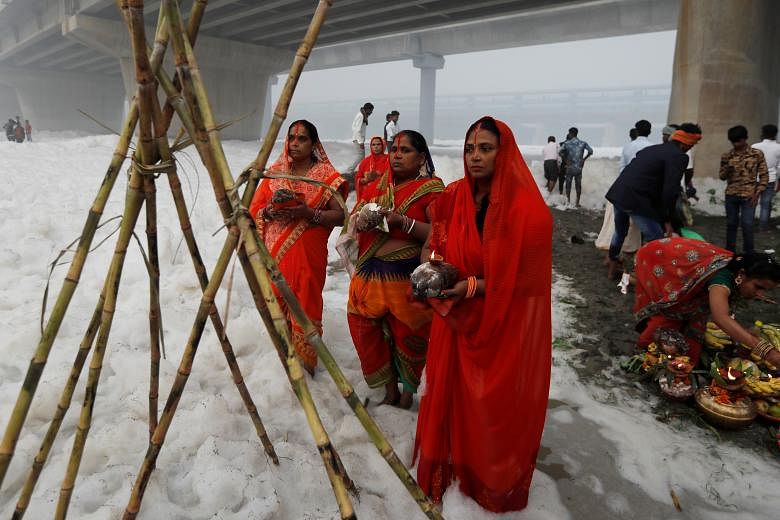In the weeks leading up to Deepavali on Oct 27, the Aam Aadmi Party (AAP) and the ruling Bharatiya Janata Party (BJP) both took credit for how pollution levels had fallen by 25 per cent over the past year in New Delhi.
The AAP, which controls the Indian capital, said it was due to a series of steps, including an improved electricity supply combined with a ban on the use of polluting diesel-power generators.
The BJP said it was due to federal government policies, including building a set of expressways that diverted vehicles using New Delhi as a thoroughfare, which had reduced pollution.
Yet, New Delhi, which has topped the list of the world's most polluted cities, was in a shroud of grey after Deepavali. As residents breathed in air that was seven to nine times above the safe limit, the self-praise turned to finger-pointing as political parties accused one another of being lax on an issue that needs bipartisan action.
BJP leader Vijay Goel said at a recent press conference: "In 2016, Health Minister Satyendar Jain said that air purifiers and mist-making devices will be deployed on major roads. So far, not even one has been installed."
The AAP said the situation had become alarming because of farmers burning stubble in the neighbouring states of Haryana and Punjab. Stubble is burned to prepare the field for the next crop.
Delhi Chief Minister Arvind Kejriwal tweeted: "Will they (Haryana and Punjab) stop crop burning? Why should New Delhi suffer?"
But environmentalists said finger-pointing and disparate action would do little to tackle a problem that has now reached crisis levels.
The capital, with a population of more than 18 million, has been labelled the world's most polluted city by the World Health Organisation in recent years.
Pollution levels have doubled over the past decade due to the proliferation of private vehicles, poor public transport systems, burning of waste and construction.
The levels started rising sharply the day after Deepavali as pollutants got trapped in the upper atmosphere following the onset of winter and the burning of stubble.

Over the past 48 hours, the Air Quality Index, which measures particulate matter, ozone and nitrogen dioxide, hit a hazardous high of 999. Readings of PM10 - particulate matter with a diameter of 10 microns or less - went up as high as nine times over the safe limit. Residents complained of sore throats and a rancid smell. Environmentalists said time for serious action had long arrived.

Mr Sunil Dahiya, senior campaigner at Greenpeace India, said: "The governments, be it the state governments or central, just have to implement the solutions with seriousness and dedication, and that's what is not happening, be it situation of transport and waste within New Delhi or rampant negligence of any rules, regulations and laws by industries and power plants in Haryana, Punjab and other states."
Pollution levels have doubled in many Indian cities over the past decade due to a combination of factors: rapid industrialisation, rise in vehicle numbers, poor public transport systems, unchecked construction in urban areas and weak enforcement of laws.
Governments have taken action, such as the National Clean Air Programme, which aims to unify actions being taken in 4,000 cities and towns. But it is still in the early stages of implementation.
Many believe the lack of concerted effort is because pollution has not become a major political issue yet, and the issue gets attention only when pollution levels spike.
Delhi is slated to hold state elections next year.
Professor Sanjay Kumar, director of the Centre for the Study of Developing Societies, said: "It is only at the moment when the crisis becomes deep, which is the case in New Delhi right now, and a health emergency is declared and everybody is talking about it, (then) all political parties want to give the message they are more keen than others.
"It is true that health is the most important thing. But pollution doesn't have (an) immediate impact. It's (a) slow poison. Once (pollution) levels go down, people will take it easy."

